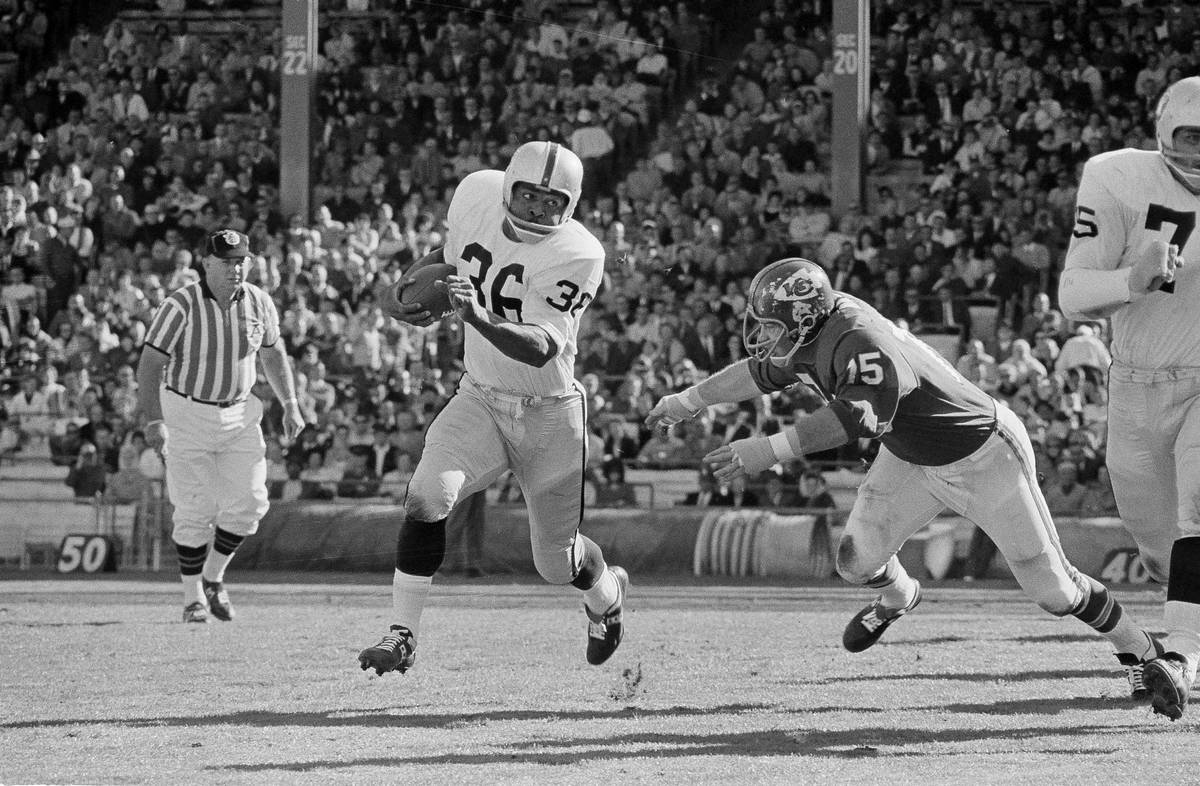Raiders’ Clem Daniels was more than just a football player
Editor’s note: This is part of an occasional series acquainting fans with the Raiders’ illustrious 60-year history as the team moves to Las Vegas for the 2020 season.
In the fight against social injustice, the peaceful protests rolling across professional sports might seem relatively new to the current generation. But longtime Raiders fans understand this is a continuation rather than a starting point.
In Clem Daniels, the third-leading rusher in franchise history, the Raiders had a shining light in the fight against racism through words and deeds that extended far beyond his injury-shortened career.
Daniels died last year at age 83. While his Raiders career ended in 1967 — three years before the NFL and AFL officially merged — his voice was a constant force across the next four decades as an advocate of causes that spanned football, justice, labor, racism and education.
A product of the segregation in McKinney, Texas, Daniels never forgot the racism he saw on a daily basis. He talked about it during his high school commencement speech at all-Black Doty High School. In it, Daniels quoted the Langston Hughes poem, “I, Too, Sing America.”
As he told the Bay Area News Group in 2016, it wasn’t long before his words made an impact.
“Then I started talking about the bigotry and oppression and how folks called Black boys they didn’t know by three names,” Daniels said. “We were all ‘George or Willie or Lee Roy.’ I got halfway through the speech, the audience was standing.”
As much as football, his dedication to fighting racism became the focal point of his life as he made his way to Prairie View University and then to professional football. The Raiders traded for him in 1961.
Over the next seven years, he became the Raiders’ first true star player and one of the best players in the AFL.
The Raiders tabbed Daniels as their halfback in 1962. Soon after, he became the first player in team history to rush for more than 1,000 yards when he gained a league-leading 1,099 yards in 1963.
A broken leg during the 1967 season marked the soon-to-be end of his career. But by the time he retired, Daniels was the all-time leading AFL rusher with 5,138 yards. His 5,103 yards as a Raider trails only Marcus Allen and Mark van Eeghen.
But it was what he did off the field that resonated far more powerfully, like the boycott of the 1965 AFL All-Star Game he helped organize among Black players when African-American players were refused basic services in the host city, New Orleans.
The trouble started immediately upon Daniels and other Black players arriving at Moisant International Airport. They noticed empty taxicabs speeding right by them, one after another, culminating when a Black player jumped into a cab with a white teammate and the car’s driver told the Black player he had to get out.
As Daniels told NOLA.com in 2015, an airport porter finally clued in the Black players.
“Hey, you guys have to call a colored cab. They have to come from the city to get you,” Daniels remembered the porter telling them.
Daniels was understandably angry. “I was ready to turn around and catch a return flight right then,” he told NOLA.com.
As the next few days unfolded, Black players saw more and more overtly racist incidents as they made their way around town, prompting Daniels and a few others to call for a boycott of the game. With more than 60,000 fans expected to attend at Tulane Stadium — at the time, New Orleans was trying to prove its worth as a host city for a professional football team — New Orleans officials pleaded with the players to reconsider.
But the players held firm to their conviction, upset by the treatment of them at hotels and restaurants and nightclubs across the city. After a vote of the Black players, they opted to officially boycott the game. The AFL eventually moved the game to Houston.
For Daniels, it was the continuation of a pledge he made to himself after seeing his mother painfully recall an incident that happened while she worked as a housekeeper for one of the wealthiest citizens in McKinney, Texas.
As Daniels recalled in 2016 to the Bay Area News Group, he was invited over to the house to be congratulated for graduating from high school and earning a full-ride scholarship at Prairie View.
Later that day, he noticed something bothering his mother, who was back home preparing dinner. Upon prodding his mother, she explained.
When you left today, she told her son, the owner of the house came to see her. “He said next time you come to the house, you make sure you come through the back door.”
Stunned, Daniels could not help but see his mother’s anguish.
“That’s when I noticed the tears streaming down her face,” he told the Bay Area News Group.
The moment changed him forever.
“That was my affirmation,” he says. “I had to do whatever I could to see that things got better for all of us.”
Daniels’ fight continued throughout his life. He became a business owner and civic leader in the Bay Area and a constant civil rights fighter throughout the South.
As he told the Bay Area News Group: “I learned pretty early that if you want things to change, you have to ask for it,” he said. “Or demand it.”
Contact Vincent Bonsignore at vbonsignore@reviewjournal.com. Follow @VinnyBonsignore onTwitter

















